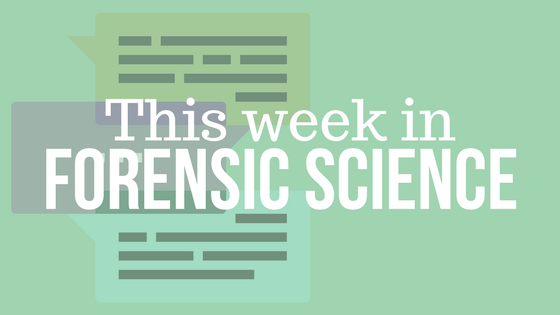No one has hours to scour the papers to keep up with the latest news, so we’ve curated the top news stories in the field of Forensic Science for this week. Here’s what you need to know to get out the door!
European Team Presents Forensic Software for 3-D Crime Reconstructions (Forensic Magazine – 4/6/2018)
A new piece of software took the CT scans, photographs, blade dimensions, and reconstructed the crime in 3-D – including the gases that filled the stab channel – together showing the victim had his arms raised in self-defense at the time he was killed.
The case analysis and conceptual software use is presented by a team of Europeans in a new paper in the journal Forensic Science International. The scientists present the software as a new way to investigate crimes – and present them to courtrooms – using raw digital data in three dimensions.
Rights of the Dead and the Living Clash When Scientists Extract DNA from Human Remains (The Conversation – 4/6/2018)
- For too long scientists failed to ask basic ethical questions: Who should control collections of human remains? What are the positive and negative consequences of studies based on skeletons? And how can scientists work to enhance, rather than undermine, the rights of the people they study?
Forensics Helps Widen Architecture’s Mission (The New York Times – 4/6/2018)
- Instead of creating a house or skyscraper, the group scours for evidence of lies, crimes and human rights violations — combining the spatial and engineering skills of architects, the data-gathering prowess of librarians, the doggedness of investigative journalists and the storytelling finesse of screenwriters.
American Scientists Travel to UK to Test DNA of Ancestors of Devon Pirate After Bones Found (DevonLive – 4/8/2018)
Experts believe the remains of Black Sam Bellamy, called the most successful pirate of all time, have been found in a shipwreck in the Cape Cod peninsula in Massachusetts
Investigative Reporter Hsu Discusses ‘Uncovering Forensic Flaws’ at Law Review Symposium (Forensic Magazine – 4/9/2018)
His 2012 series on weaknesses in forensic science was a finalist for the Pulitzer Prize gold medal for public service. He reported that the Justice Department had been aware for years that certain forensic testing was flawed, which may have led to innocent people being convicted. The focus was on the unit dealing with miscroscopic hair analysis.
Prominent Academics Call for More Science in Forensic Science (Phys Org – 4/9/2018)
- With forensic science facing mounting scrutiny as it plays an increasingly prominent role in the administration of justice, six scientists who recently served on the National Commission on Forensic Science are calling on the scientific community at large to advocate for increased research and financial support of forensic science as well as the introduction of empirical testing requirements to ensure the validity of outcomes. Their call to action appeared in the Proceedings of the National Academy of Sciences (PNAS) the week of April 9, 2018.
Forensic Scientist Jodie Ward on Solving Missing Persons Cold Cases (Financial Review – 4/9/2018)
From unknown soldiers to missing persons, Dr Jodie Ward’s job is to discover the identities of the hundreds of John and Jane Does in Australia and bring closure to families of the missing.
Ward and her 4 staff at NSW Health Pathology’s Specialist DNA Laboratory have now identified 20 people, but there are still 500 unidentified remains in the country and more than 2000 long-term missing persons.
An Indian State is Using Blockchain to Collect DNA Data of 50 Million Citizens (Quartz – 4/9/2018)
- The government of Andhra Pradesh (AP), India’s eighth-largest state, on March 28 announced that it had signed up a private firm to build a blockchain-based DNA database of its 50 million citizens.
The partnership with Shivom, a German genomics and precision medicine company, will help improve predictive medicine in the country, the N Chandrababu Naidu-led government said.
Whispering Bones: Interpreting Death as a Forensic Anthropologist (The Sewanee Purple – 4/10/2018)
- Davis is a Research Associate with the Forensic Anthropology Center at the University of Tennessee-Knoxville (UTK), with Bachelor’s Degrees in Neuroscience and Anthropology as well as a Master’s Degree in Forensic Anthropology. At UTK she coordinates the Body Donation Program, which allows volunteers to donate their body to the Anthropology Research Facilities after their deaths, where students are trained in the field to understand the varying stages of decomposition of the human body.
Arizona Nabs Murder Suspect With Familial DNA Searching on First Try (Forensic Magazine – 4/11/2018)
- The murderer of 31-year-old Allison Feldman had left DNA in her home, but that genetic profile did not show up in any state or national databases for more than three years.
But when Arizona law enforcement tried familial DNA searching for the first time on the high-profile killing, it pointed to the murderer’s brother—and then the killer himself, Arizona authorities announced Tuesday.
“Buckskin Girl” Case: DNA Breakthrough Leads to ID of 1981 Murder Victim (CBS News – 4/12/2018)
- Dr. Elizabeth Murray, a forensic anthropologist with Mount St. Joseph University in Cincinnati, said the case involved “groundbreaking” work through the nonprofit DNA Doe Project to apply genetic genealogy to the identification of unknown persons.
WOULD YOU LIKE TO SEE MORE ARTICLES LIKE THIS? SUBSCRIBE TO THE ISHI BLOG BELOW!


